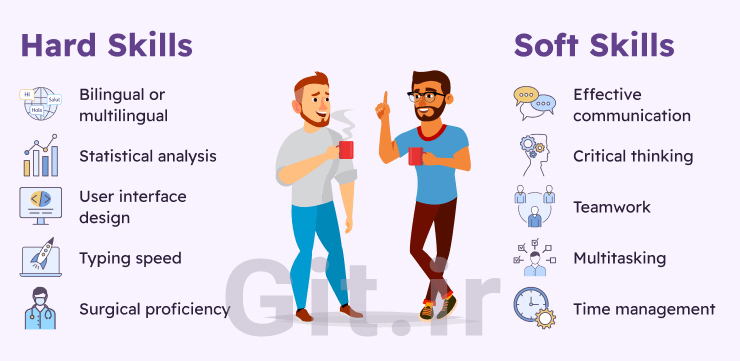What Is the Difference Between Hard and Soft Skills?
Every job requires a mix of hard and soft skills. Understanding the difference between these skill sets and knowing how to highlight them on your resume is essential for career success.

Hard skills are technical abilities or specialized knowledge that are often specific to certain roles. These include skills like data analysis, coding, and financial management. On the other hand, soft skills are the workplace skills that focus on how you approach your work and interact with others. These include teamwork, communication skills, adaptability, and problem-solving.
In this article, we’ll explore the key differences between hard and soft skills and how you can continue to develop both to boost your professional development.
Hard Skills vs. Soft Skills
Hard skills (also known as technical skills) are specific abilities required for a particular job, while soft skills (or workplace skills) are the qualities that determine how you perform your work. For example, a sales representative needs technical skills like customer service and product knowledge, along with soft skills like communication to effectively interact with customers.
Both technical and workplace skills work together to help you succeed in almost any job. Employers often seek candidates who possess a balance of both. Technical skills demonstrate your ability to perform the practical aspects of the role, while soft skills show that you can contribute to a positive, collaborative, and productive work environment.
Examples of technical skills include computer programming (Python, Ruby, etc.), coding, database management, data analysis, SEO/SEM marketing, sales/business analysis, financial management, UX design, medical proficiency, bookkeeping, plumbing, writing and editing, reporting, teaching, cooking, and engineering.
Examples of workplace skills include creativity, empathy, teamwork, problem-solving, critical thinking, adaptability and flexibility, organization, integrity, effective communication, reliability, open-mindedness, punctuality, time management, attention to detail, strategic thinking, conflict resolution, and work ethic.
A solid mix of hard and soft skills makes you more versatile and appealing to potential employers. Developing both technical and workplace skills is crucial for your career success and professional development.

What Are Hard Skills?
Hard skills, also known as technical skills, are the practical abilities and knowledge needed to perform specific tasks. These skills are typically learned through training, education, or hands-on experience. For instance, a nurse learns how to administer a vaccine, while a graphic designer uses specialized software to complete design projects. Hard skills can include a wide range of abilities, such as mastering a foreign language, conducting data analysis, or performing financial forecasting to predict stock market trends.
Examples of Hard Skills
Hard skills refer to specific abilities or expertise that you acquire through training, education, or experience. Here are some common examples of hard skills:
Data analysis and interpretation
Engineering principles and practices
Financial management and budgeting
Proficiency in a foreign language
UX design for creating user-friendly interfaces
Web development and coding
Writing and editing for professional or creative projects
To upgrade some of your technical skills, check out the following courses:
▶️ View Course: The Complete Python Bootcamp From Zero to Hero in Python
▶️ View Course: The Complete 2024 Web Development Bootcamp
What Are Soft Skills?
Soft skills, often referred to as workplace skills, are qualities that reflect how you approach your work and interact with others. Unlike technical skills, soft skills are typically described in qualitative terms and apply across various roles. These attributes make you a valuable employee, supportive colleague, and effective communicator. Because they are not tied to a specific job, they are considered highly transferable skills that can benefit you in any profession.
Examples of Soft Skills
Soft skills highlight your work style and personal attributes. Common examples include:
Adaptability to changing situations
Collaboration with team members
Critical thinking for decision-making
Empathy in understanding others' perspectives
Organization for managing tasks efficiently
Problem-solving to overcome challenges
Strategic thinking to achieve long-term goals
Teamwork for fostering cooperation and success
To improve your soft skills, check out the following courses:
▶️ View Course: Critical Thinking Strategies For Better Decisions
▶️ View Course: Manage Change Through Collaboration and Team Work
Workplace Skills Are Increasingly Important
Workplace skills are becoming more essential in today’s professional landscape. According to the US Department of Labor, business leaders often value workplace skills—such as networking, enthusiasm, professionalism, communication, and critical thinking—more than technical skills.
As automation continues to transform industries, social and emotional skills have gained even greater significance. A report by Statista highlights that between 2023 and 2027, skills like creative thinking, analytical thinking, curiosity, flexibility, systems thinking, self-awareness, active listening, and leadership are expected to grow in importance for employers.
Additionally, the Society for Human Resource Management (SHRM) notes that 30 percent of HR professionals face hiring challenges due to a lack of candidates with strong soft skills. In response, some employers now use personality tests and other tools to assess workplace skills during the hiring process.
How to Leverage Your Skills for Career Success
Both technical skills and workplace skills are essential for career success. You can enhance these skills through professional development programs, like those available on Coursera, or by learning on the job. Here are some strategies to maximize your skills:
Learn on the Job: Treat your role as a learning opportunity. Take on varied responsibilities to build and strengthen your technical and workplace skills.
Collaborate Across Teams: Expand your teamwork and organizational abilities by working with colleagues from different departments. This could include organizing team-building activities or events to foster collaboration and a positive work environment.
Practice Leadership: If you're in a leadership role, focus on developing your workplace skills by actively engaging with your team. Use strategies like active listening, offering mentorship, and providing support to cultivate a sense of belonging and strengthen team dynamics.
By consistently developing and applying both technical and workplace skills, you can position yourself for long-term career success.
How to Showcase Your Hard and Soft Skills
Effectively presenting your skills is crucial when applying for jobs. Highlight your technical and workplace skills in your resume, job applications, and interviews to stand out. Here's how:
1. Highlight Hard and Soft Skills on Your Resume
Customizing your resume for each job application is a best practice. Review the job description and match your technical and workplace skills to the requirements. When listing your previous responsibilities, incorporate these skills strategically to demonstrate your fit for the role.
2. Demonstrate Hard and Soft Skills in a Job Application
A job application, particularly the cover letter, provides an excellent opportunity to elaborate on your skills and the impact you’ve made in previous roles. Use this space to highlight specific examples that showcase both your technical and workplace skills, focusing on results and contributions.
For instance, if you’re applying for a marketing manager position, you could write about a project where you organized a team of Instagram and TikTok influencers to promote a product. You might mention that your efforts led to sales reaching five times the projected target within the first week.
This example not only highlights technical skills, such as using social media platforms and analyzing data, but also demonstrates workplace skills like innovation, collaboration, and strategic thinking. Providing concrete examples like these can make your application stand out and show employers how your skills align with the role.
3. Show Your Skills in a Job Interview
A job interview is a chance to showcase both your technical and workplace skills. While discussing your technical skills is expected, you can also demonstrate workplace skills like effective communication, professionalism, and attention to detail. Small actions, such as promptly accepting a calendar invite, arriving on time (whether in-person or online), and sending a polite thank-you email afterward, can leave a positive impression.
To give clear and structured responses, the STAR method can be incredibly useful. STAR stands for Situation, Task, Action, and Result, and it helps you frame your answers with specific examples that highlight your skills.
🔷 View the list of Interviewing Skills courses.

Here’s an example of how to use the STAR method in an interview:
Situation: At my previous job as a sales associate, a coworker resigned shortly before a major project deadline.
Task: I was tasked with completing several weeks’ worth of work within a few days.
Action: I requested my manager to adjust my regular responsibilities and collaborated with other team members to distribute tasks effectively. I also spent two days reviewing the project details and refreshing my Excel skills. Working closely with my intern, I created a plan to finish the assignment within five days.
Result: By prioritizing the project, I delivered it on time and with high accuracy. My manager commended my dedication, and I was entrusted with additional responsibilities afterward.
Using such examples not only communicates your technical skills, like proficiency with Microsoft Excel, but also emphasizes workplace skills such as teamwork, adaptability, and leadership.
▶️ View Course: The Complete Resume, LinkedIn & Get Your Dream Job Course!
🎧 Listen to the audio summary of Case Interview Secrets
Frequently Asked Questions in this area
1. Which is more important: Technical or workplace skills?
Both technical skills and workplace skills are essential for nearly every job. While some roles may emphasize technical expertise, others may require a stronger focus on workplace skills. Ultimately, a combination of both is important for success in most careers.
2. What are the most important workplace skills?
The significance of workplace skills depends on the role and the employee. McKinsey outlines four broad categories of "foundational skills": cognitive, digital, interpersonal, and self-leadership. Examples include communication and mental flexibility in the cognitive category, and teamwork in the interpersonal category. According to a 2024 LinkedIn survey, some of the most in-demand workplace skills include:
Communication
Customer service
Leadership
Teamwork
Problem-solving
Adaptability
🎧 Listen to the audio summary of Learning Leadership
🎧 Listen to the audio summary of Bulletproof Problem Solving
3. What types of technical skills are most attractive to job recruiters?
The technical skills that attract job recruiters vary by position. However, some common technical skills that are highly valued include:
Web development
DevOps
Database software skills
Cybersecurity
AI, machine learning, and deep learning
Checking job listings related to your desired career can help identify the most relevant skills for your specific job search.
To learn more about some of these skills, see the following tutorials:
▶️ View Course: The Complete Cyber Security Course : Hackers Exposed!
▶️ View Course: DevOps Beginners to Advanced with Projects
4. Can I learn workplace skills at home?
Yes, workplace skills can certainly be developed at home. These skills are often honed through everyday experiences and interactions with others. Online courses, such as those available on Git, can also provide valuable training in areas like communication, leadership, and teamwork.
Please Log in to leave a comment.